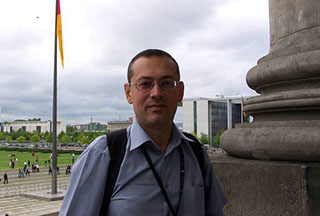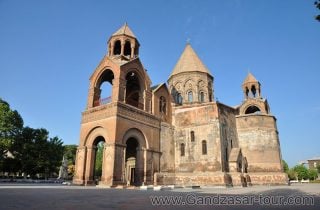“Russia-Azerbaijan Rapprochement Expectations Give Ground for Concern”

Armen Grigoryan, columnist on Eurasian Security for the Jamestown Foundation, in the interviewee of 168.am.
– Mr. Grigoryan, these days international expert community is actively discussing Russia’s resolution on withdrawal from Syria, regarding which some experts on international affairs see threats, claiming that, by withdrawing its troops from Syria, Russia, according to its traditional policy pursued through recent years, will “activate” in other directions. One of them is Karabakh conflict. These concerns are more grounded in the context of Moscow-Baku military-political dialogue, publications of “political trade” and list of Armenia’s weaponry and military equipment. What threats do you see on the conflict zone on account of recent trends of international developments?
–Russia continues to get isolated from the civilized world: condemning verdict towards Nadejda Savchenko more deepens the process. Azerbaijan is among those few countries, which may still extend its ties with Russia, not being afraid of further discrediting. Subject of Russia-Azerbaijan trade, naturally, will refer to interests of Armenia and NKR. Besides, economic factor may impact on the conflict as well, as a result of fall in price for oil both Russia and Azerbaijan may become more unpredictable, for the two one of the possible variants to soothe internal tension due to social-economic situation is making use of the conflict, for the purpose to change current status quo.
–Recently an interesting event was recorded, Andrzej Kasprzyk, the Personal Representative of the Chairperson-in-Office, ambassador, called the parties of Karabakh conflict, on account of the coming religious holidays, to refrain from ceasefire violations, which, in essence, parties have agreed on, although, in practice it’s not clear yet how active it’ll be. To which extent likewise initiatives may become precedential for the whole process of conflict settlement, on account of Russia’s “absence” from this initiative as well?
–Likewise initiatives formerly have been recorded as well, however, the point is, by that initiative OSCE basically is getting along with the fact that non-violation of ceasefire throughout 1-2 weeks is considered an “acquisition.”
– In one of the articles, published in the Washington times, it’s reported that Barak Obama, president of the USA, has an exclusive chance for establishing peace between Yerevan and Baku within 4th Nuclear Security Summit (NSS) to be held on March 31, in Washington. To your mind, will Obama appear with a diplomatic initiative? And, generally what may we expect from presidential meeting in Washington, also on account of the fact that steps have been taken by Azerbaijani authorities to please the West, then Azerbaijan also agreed on maintenance of ceasefire, i.e. positive trends are observed?
– It’ll be possible to think of positive trends, if, for instance, an accord is reached in Washington on establishing investigation of incidents on the dividing line. It may be an essential step to ground expectations of further progress. However, expectations on Russia-Azerbaijan rapprochement instigate concern on the possibility to reach practical outcome.
–Azerbaijani “Trend” agency circulated information that in early April Sergei Lavrov, Minister of Foreign Affairs of Russian Federation, will visit Baku, who will discuss NKR issue with Azerbaijan, as well as perspectives for “North-South” corridor. Lavrov is getting ready to leave for Baku after presidential meeting in Washington, and there are doubts, that Lavrov will leave for Baku by traces of Washington meeting. According to you, does Moscow have concerns regarding those meetings, and what may we expect from that visit, if any progress is recorded?
–Russia will try to use its influence to maintain control over the conflict settlement process. During Lavrov’s visit and further on, naturally, an attempt will be made to neutralize the possibility of developments not desirable for Russia. Russia, that has kept the region under its control for over decades due to the conflict, won’t surrender easily.
By Araks Martirosyan

























